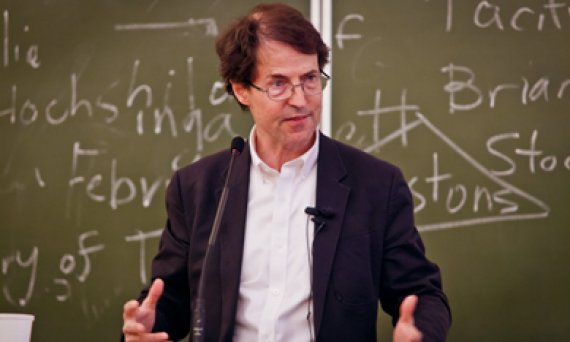As part of the Interdisciplinary seminar of the Political Science and Sociology Department the EUSP hosted Rogers Brubaker, a globally known specialist on questions of ethnicity and nationalism and Professor of Sociology at UCLA.
- The size of the audience speaks for itself and for Rogers Brubaker, - said Artem Magun, the Dean of the Political Science and Sociology Department. He also thanked the Kazan Center for Cultural Studies of Post-Socialism who initiated and facilitated the visit of the distinguished guest.
Brubaker started the lecture stating that language and religion are both huge subjects and referring to both at a time during one lecture would be foolish, as he said. According to Brubaker, language and religion are arguably the two most socially and politically consequential domains of cultural difference in the modern world.
- Although seemingly incomparable, language and religion can be construed in a way that makes comparison possible and fruitful, - he added.
In popular understanding both language and religion sort people into communities. Therefore, they are intertwined with ethnicity and nationhood. They are basic sources of political identification as well as ways of construing sameness. However, Brubaker argued that neither language nor religions is primordial and fixed just like ethnicity and nationhood, they are rather powerfully shaped by political, economic and cultural processes and they are subject to change as circumstances change.
Brubaker acknowledged that the category of religion is a problematic category, but he preferred to primarily look at institutionalized and so-called Abrahamic religions without a critical approach to what religion is in itself. One of the main points that Brubaker returned to a few times during the lecture was that religion, unlike language, cannot be described as an inescapable medium of public activity and that public life can in principle be non-religious, but it cannot be a-linguistic.
- Complete neutrality of the state towards religion is a myth, - Brubaker stated. However, he argued that although there are some moves towards greater neutrality towards religion in some states, there is no similar thing in the domain of language. With respect to language, no state has moved towards neutrality. A state has to have one or a few languages to function.
He then referred to minority rights and protection of linguistic and religious diversity in modern states as well as drew a more detailed picture of the features and functional meanings of language and religion in contemporary societies. Before the hour-long discussion of the lecture would begin, Brubaker made a few clear and straightforward concluding notes that would underline the growing significance of religion.
- Deprivatization and repoliticization of religion is an important reality, - he said, - immigration generates new forms of linguistic and religious pluralism, but the religious pluralism is more deeply institutionalized than the linguistic pluralism. Religion has tended to displace language as the cutting edge of the most intense forms of contestation over the political accommodation of cultural difference; this is a striking reversal of the long term process through which previously language had displaced religion as the primary focus of contestation.
Gevorg Avetikyan


















